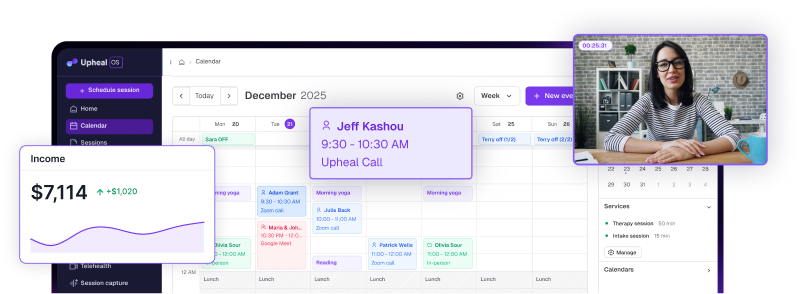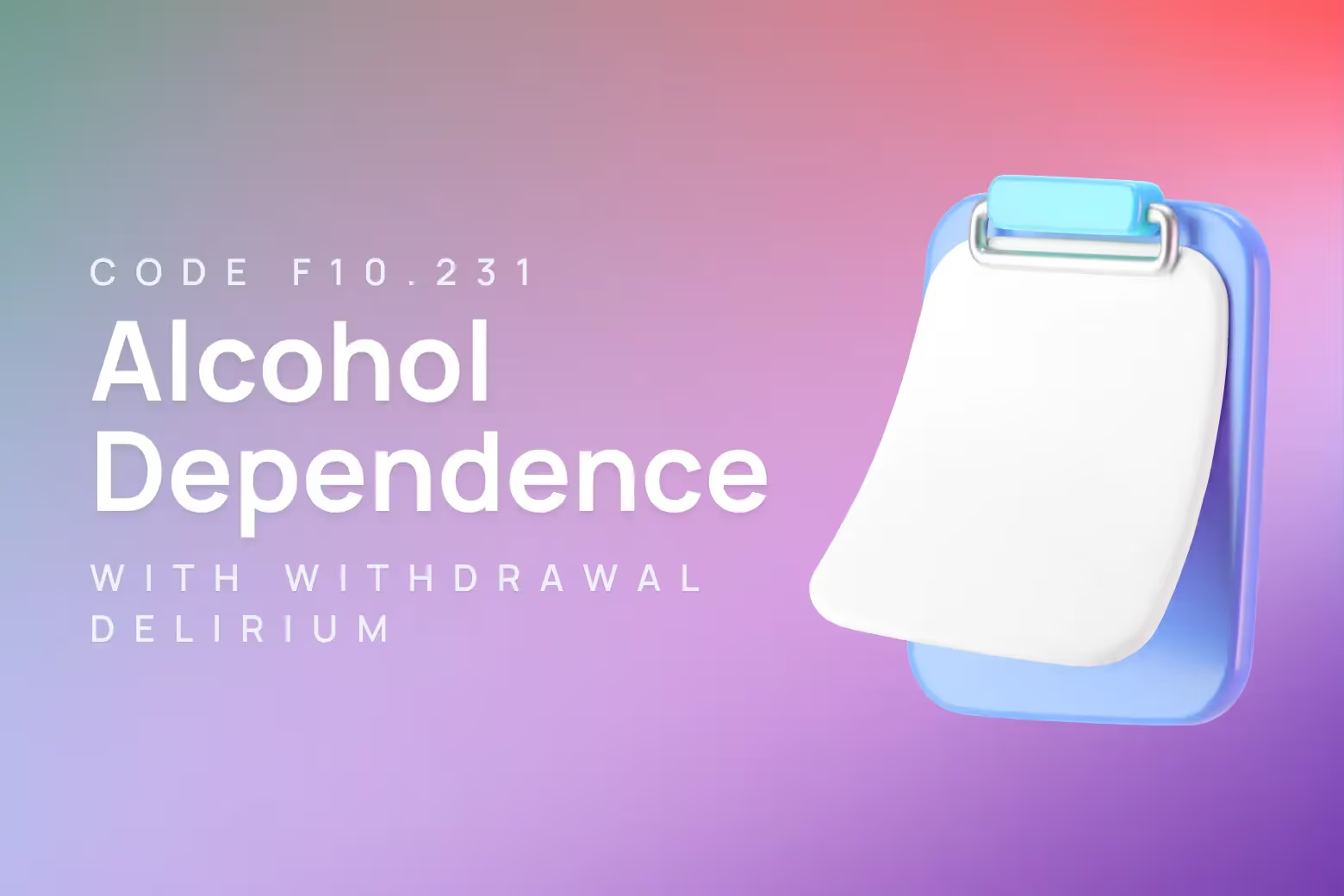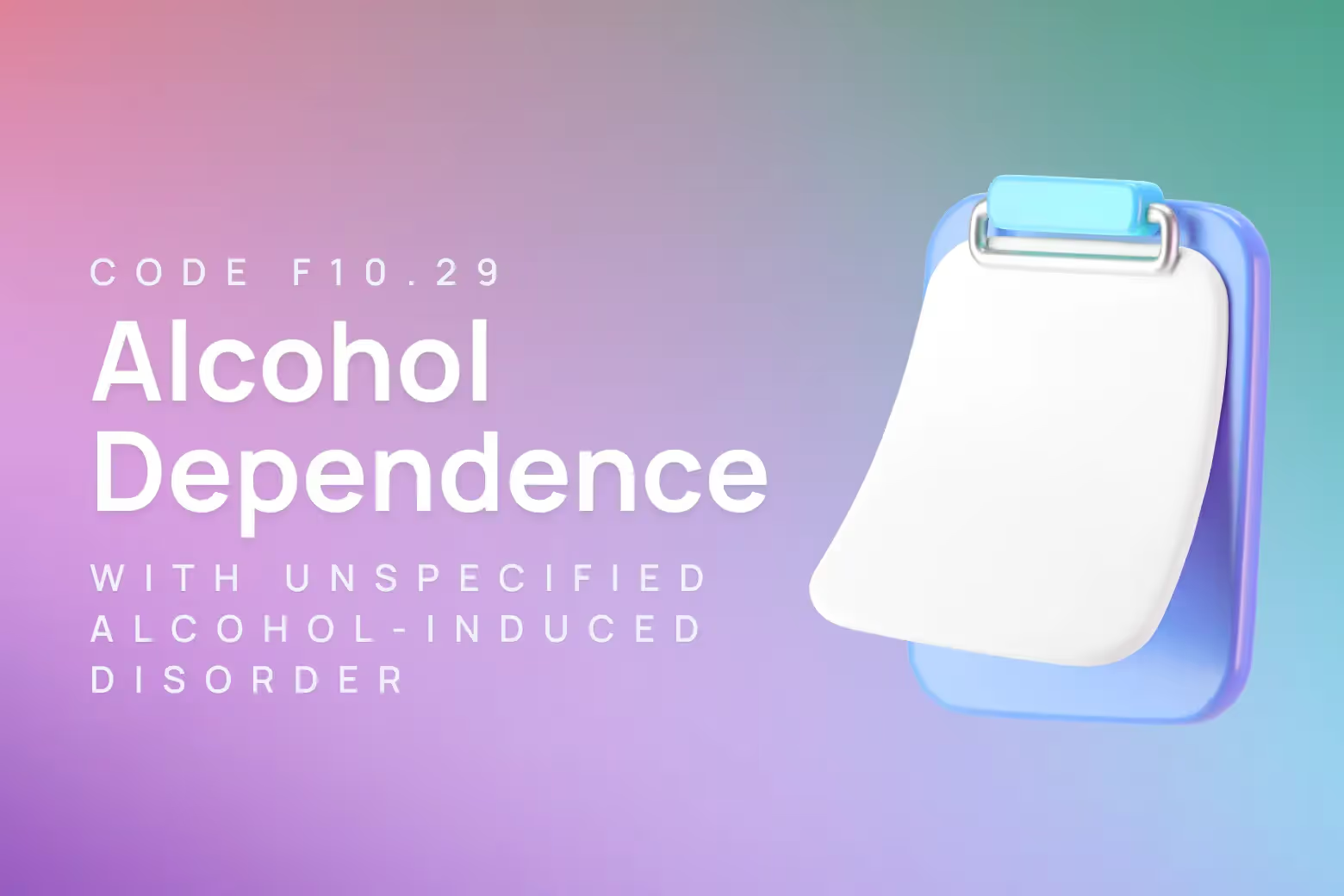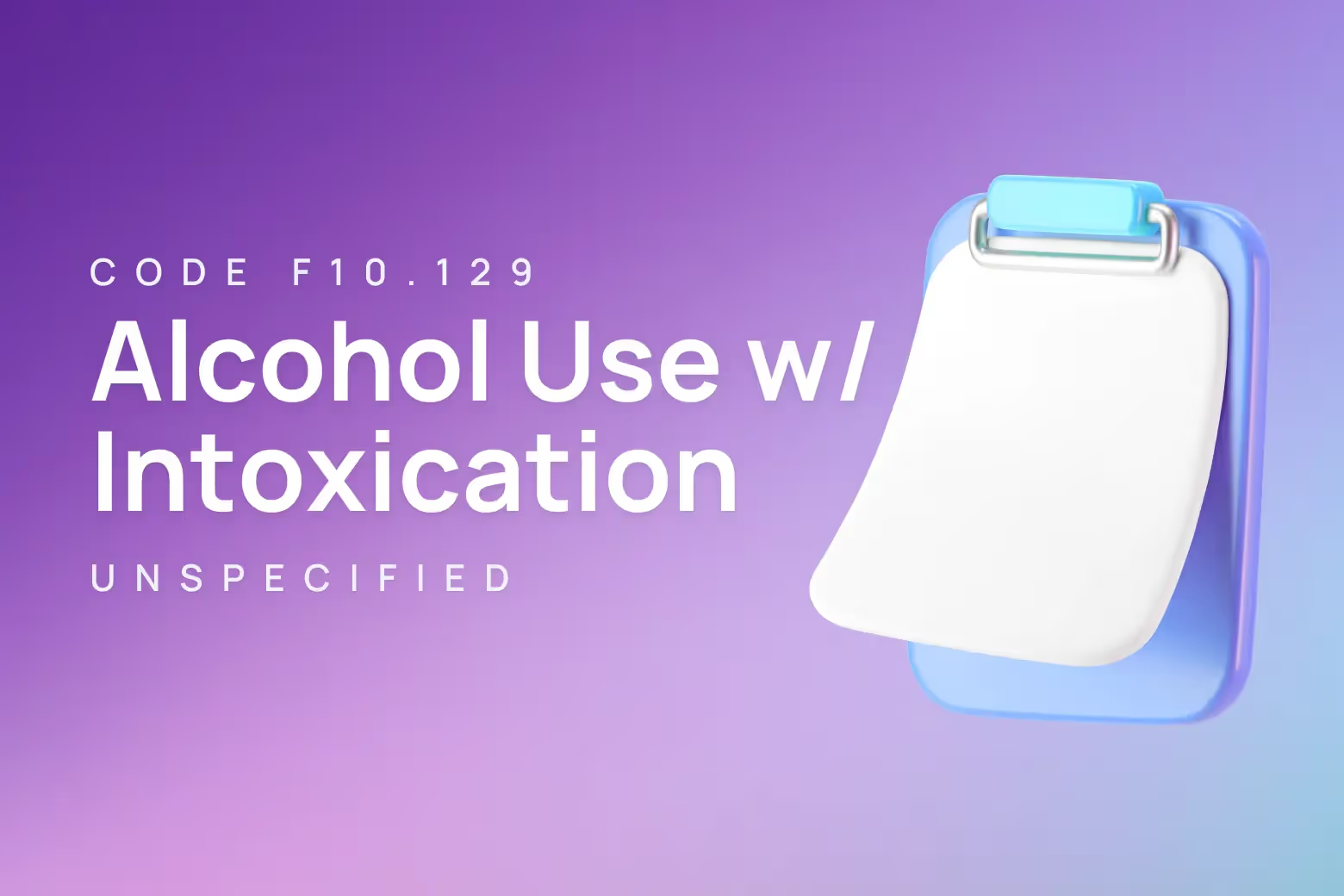ICD-10 code for alcohol dependence with alcohol-induced persisting dementia
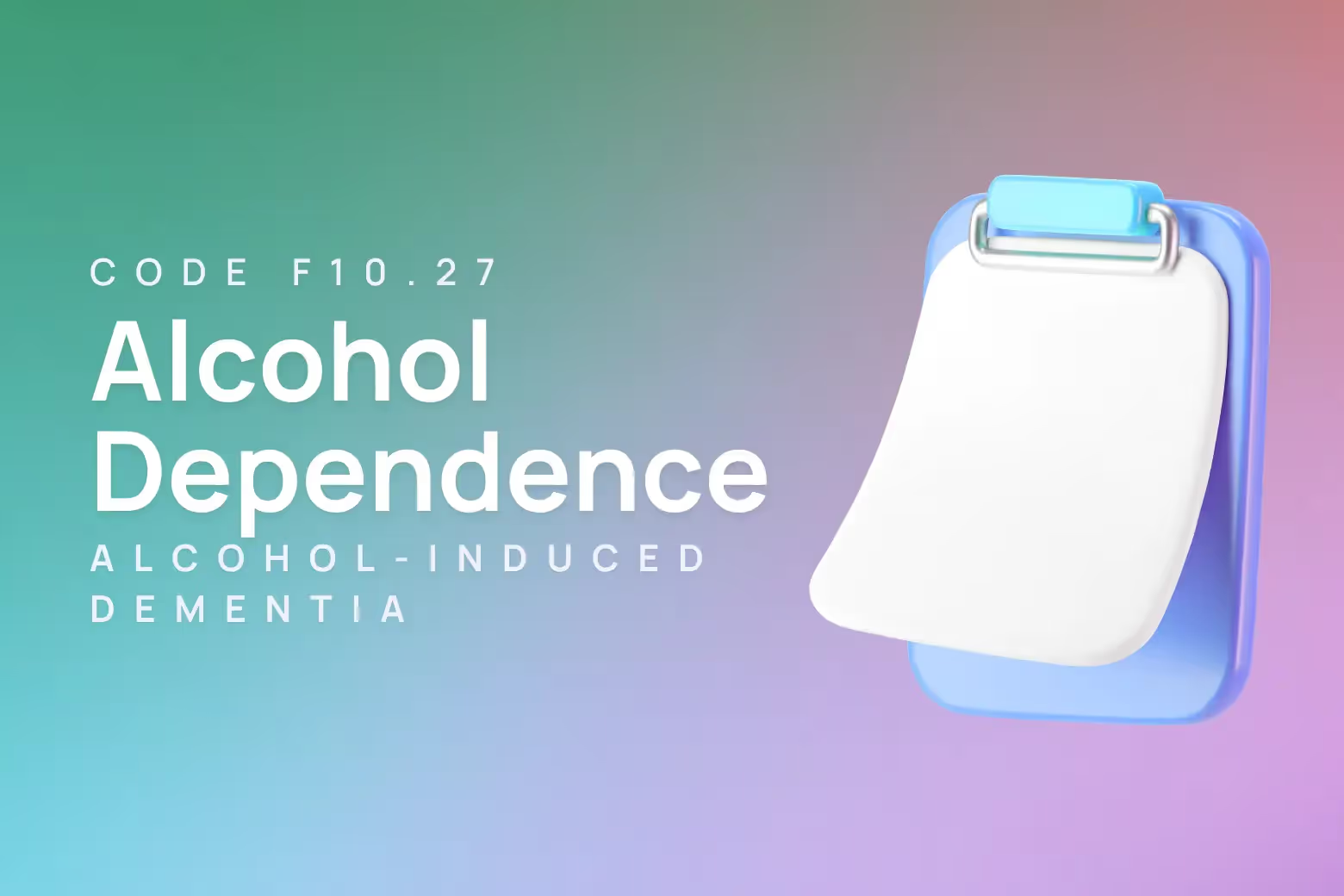
F10.27 is the ICD-10 code for alcohol dependence with alcohol-induced persisting dementia.
This diagnosis applies when chronic, heavy alcohol use has caused lasting cognitive impairment that persists even after drinking stops.
Accurate diagnosis is essential because it guides treatment planning and helps clinicians distinguish between reversible alcohol-related cognitive effects and permanent brain damage.
Key features:
- Requires documented history of alcohol dependence meeting DSM-5 criteria plus evidence of persistent cognitive deficits affecting memory, executive function, and daily functioning
- Cognitive impairment must continue beyond the acute intoxication or withdrawal period, typically assessed after at least 60 days of abstinence
- Differentiates from alcohol-induced major neurocognitive disorder (dementia) without dependence (F10.97) and reversible alcohol-related cognitive changes
- Treatment focuses on abstinence maintenance, cognitive rehabilitation, nutritional support, and safety planning for functional deficits

Diagnostic criteria for alcohol dependence with alcohol-induced persisting dementia (F10.27)
Clinicians must establish two distinct conditions to assign F10.27: current alcohol dependence and persistent cognitive impairment caused by chronic alcohol exposure.
The alcohol dependence component requires at least two of the following symptoms within a 12-month period:
- drinking larger amounts or for longer than intended
- persistent desire or unsuccessful efforts to cut down
- significant time spent obtaining or recovering from alcohol
- craving
- failure to fulfill major obligations
- continued use despite social problems
- giving up important activities
- use in hazardous situations
- continued use despite physical or psychological problems
- tolerance
- withdrawal symptoms.
For the dementia component, cognitive deficits must be severe enough to interfere with independence in everyday activities. The impairment typically affects multiple domains:
- Memory deficits - particularly learning new information and recalling recent events, though remote memory may be preserved initially
- Executive dysfunction - problems with planning, organizing, sequencing tasks, and abstract reasoning
- Language difficulties - word-finding problems, reduced verbal fluency, comprehension difficulties
- Visuospatial impairment - difficulty with navigation, spatial relationships, constructional tasks
- Personality changes - apathy, disinhibition, emotional lability, or impaired social cognition
The cognitive impairment must persist beyond the period of acute intoxication or withdrawal. Most clinicians assess after at least 60 days of documented abstinence to rule out reversible effects.
When to use F10.27 diagnosis code
Accurate differential diagnosis ensures appropriate treatment and realistic prognosis discussions with patients and families.
F10.27 vs F10.97 (Alcohol use, unspecified with alcohol-induced persisting dementia)
F10.27 requires documented alcohol dependence meeting full diagnostic criteria, while F10.97 applies when alcohol-induced dementia is present but the clinician cannot determine whether dependence criteria are met.
Use F10.27 when you have clear evidence of tolerance, withdrawal, loss of control, and continued use despite consequences.
Choose F10.97 only when the cognitive impairment is clearly alcohol-related but historical information is too limited to confirm dependence.
F10.27 vs F10.239 (Alcohol dependence with withdrawal, unspecified)
F10.239 describes acute alcohol withdrawal syndrome without persistent cognitive impairment. Withdrawal-related confusion, tremors, and agitation typically resolve within days to weeks.
F10.27 indicates lasting brain damage that continues long after withdrawal symptoms subside. A patient might experience F10.239 during detoxification and later meet criteria for F10.27 if cognitive deficits persist.
F10.27 vs G31.2 (Degeneration of nervous system due to alcohol)
G31.2 covers other alcohol-related neurological conditions like cerebellar degeneration or peripheral neuropathy.
Use F10.27 specifically when cognitive impairment is the primary concern and meets dementia criteria.
G31.2 applies when alcohol has caused predominantly motor, sensory, or coordination problems rather than cognitive decline (Clinical Documentation).
Related ICD-10 codes
- F10.20 - Alcohol dependence, uncomplicated
- F10.21 - Alcohol dependence, in remission
- F10.239 - Alcohol dependence with withdrawal, unspecified
- F10.97 - Alcohol use, unspecified with alcohol-induced persisting dementia
- F10.988 - Alcohol use, unspecified with other alcohol-induced disorder
- G31.2 - Degeneration of nervous system due to alcohol
- E51.2 - Wernicke encephalopathy
- F10.26 - Alcohol dependence with alcohol-induced persisting amnestic disorder
Interventions and CPT codes for alcohol dependence with alcohol-induced persisting dementia
Treatment for F10.27 addresses both ongoing addiction and cognitive rehabilitation while managing safety concerns related to impaired judgment and memory.
Initial psychiatric evaluation
Comprehensive assessment establishes baseline cognitive function, determines current drinking status, evaluates safety risks, and develops a treatment plan addressing both addiction and dementia.
Testing may include standardized cognitive screening tools, functional assessment, and collateral information from family members.
CPT code 90791 - Psychiatric diagnostic evaluation. Use for the initial intake visit when establishing the dual diagnosis and creating a comprehensive treatment pla.
Individual psychotherapy
Modified psychotherapy approaches help patients maintain abstinence despite cognitive limitations.
Sessions incorporate memory aids, simplified relapse prevention strategies, repetition of key concepts, and involvement of support persons.
Motivational interviewing techniques adapt to cognitive deficits by using concrete examples and external reminders.
CPT codes 90832 / 90834 / 90837 - Psychotherapy sessions of 30, 45, or 60 minutes. Select based on actual session duration and document specific cognitive adaptations used. Longer sessions (90837) may be necessary given slower processing speed and need for repetition.
Family psychotherapy
Family involvement becomes critical when cognitive impairment affects safety and decision-making.
Sessions address codependency patterns, teach families to support abstinence without enabling, establish safety monitoring systems, and help families adjust expectations based on cognitive limitations.
CPT codes 90846 / 90847 - Family psychotherapy without or with the patient present. Use when working directly with family members on communication strategies, realistic expectations, and home safety planning.
Group therapy
Modified group interventions provide peer support while accounting for cognitive limitations. Groups use structured formats, written materials, frequent summaries, and external reminders between sessions.
CPT code 90853 - Group psychotherapy. Appropriate for specialized substance use disorder groups modified for participants with cognitive impairment.
Screening and brief intervention
For patients in early stages or when cognitive impairment is mild, structured screening and brief counseling may prevent progression. Document the screening tool used, score, risk level, and specific intervention elements.
CPT codes 99408 / 99409 - Structured screening plus brief intervention, 15-30 minutes or greater than 30 minutes. Use with commercial insurers when providing SBIRT services (CPT Codes Reference).
HCPCS codes G0396 / G0397 - Structured assessment plus brief intervention for Medicare beneficiaries, 15-30 minutes or greater than 30 minutes. Note these are for assessment/treatment, not preventive screening.
Standardized screening instruments
Administering and scoring validated tools like the AUDIT, AUDIT-C, or cognitive screening instruments provides objective documentation of severity.
CPT code 96127 - Brief emotional or behavioral assessment, per instrument. Bill for each standardized screen administered and documented when payer policies allow separate payment.
How Upheal improves F10.27 ICD-10 documentation
Clinical documentation for complex dual diagnoses requires capturing detailed cognitive assessments, functional limitations, and treatment modifications while maintaining HIPAA compliance.
Suggesting appropriate ICD-10 codes based on session content
Upheal's clinical documentation platform analyzes session notes to identify when cognitive impairment patterns emerge alongside substance use discussions.
The platform recognizes mentions of memory problems, executive dysfunction, functional decline, and alcohol use history, then suggests F10.27 when appropriate.
This helps clinicians catch the progression from uncomplicated alcohol dependence (F10.20) to alcohol-induced dementia, ensuring diagnosis codes accurately reflect clinical severity.
Maintaining HIPAA-compliant records with proper diagnostic coding
F10.27 documentation requires detailed cognitive assessment data, family collateral information, and longitudinal tracking of both substance use and cognitive function.
Upheal securely stores this sensitive information while maintaining proper code assignment throughout treatment.
The platform tracks when cognitive testing occurs, documents abstinence periods necessary to confirm persistent impairment, and links treatment modifications to the dementia diagnosis.
Reducing administrative burden so you can focus on client care
Clinicians treating F10.27 patients face extraordinary documentation demands: detailed mental status exams, cognitive test results, safety assessments, family communications, and coordination with medical providers.
Upheal automates routine documentation tasks, generates progress notes that capture both addiction and cognitive elements, and ensures billing codes match clinical complexity.
This automation lets clinicians spend more time on direct clinical work—adapting therapeutic techniques for cognitive limitations, providing caregiver support, and coordinating multidisciplinary care.
Supporting clients with alcohol dependence and persisting dementia
Clients with F10.27 require compassionate care that acknowledges both their addiction and cognitive limitations without blame or judgment.
Treatment focuses on harm reduction, maximizing remaining cognitive abilities, and creating external supports that compensate for impaired memory and judgment.
Clinicians must balance multiple goals: maintaining abstinence, preventing further cognitive decline, ensuring safety despite impaired judgment, addressing depression and anxiety common in dementia, and supporting families managing the dual burden of addiction and cognitive impairment.
Realistic goal-setting becomes essential as permanent brain damage may limit recovery potential.
Upheal helps clinicians manage these complex cases by streamlining documentation, suggesting appropriate codes as clinical presentations evolve, and maintaining comprehensive records that support coordinated care.
Learn how Upheal can improve your clinical documentation workflow at upheal.io/signup.
